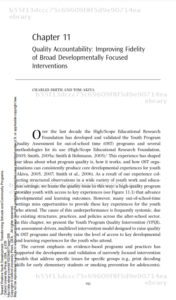Abstract
This chapter describes the Youth Program Quality Intervention (YPQI), a setting-level intervention model designed to raise quality in out-of-school time programs. The YPQI takes managers and staff from a network of youth programs through a process of identifying and addressing strengths and areas for improvement, using a standardized assessment tool. This tool operationalizes a definition of program quality based on providing youth access to key developmental experiences. Descriptive findings about the quality of youth programs are presented. A three-level model of settings also addresses system accountability, management, and the point of service in youth programs. The chapter discusses accountability structures ranging from low stakes to higher stakes, and presents a generic model for setting change.
Smith, C.M., & Akiva, T. (2008). Quality Accountability: Improving Fidelity of Broad Developmentally Focused Interventions. In M. Shinn & H. Yoshikawa (Eds), Toward Positive Youth Development: Transforming Schools and Community Programs (pp. 192-212). Oxford University Press: New York. https://doi.org/10.1093/acprof:oso/9780195327892.003.0011
